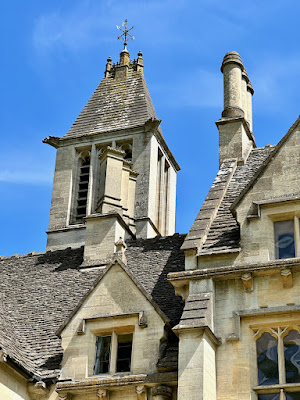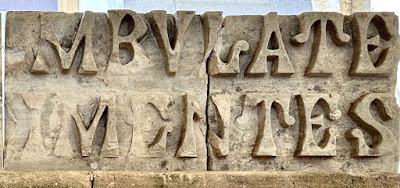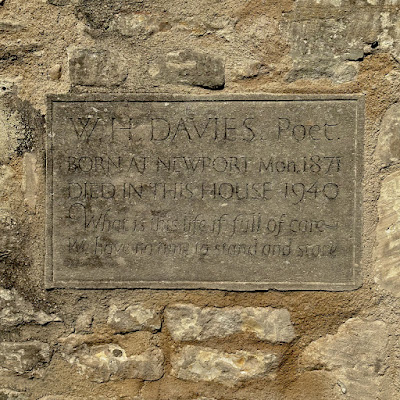Remnants of the original Cotswold stone carvings placed on the clock tower of the Woodchester Mansion, circa 1860. The original words entire:
In sapientia ambulate, tempus redimentes (Walk in wisdom, … Redeeming the time). Ephesians 5, 15-16 in the Latin translation from the Koine Greek of the original written Ephesians of the New Testament.
Plaque, Glendower Cottage, Nailsworth, Gloucestershire reads:
W.H. Davies. Poet.
Born at Newport Mon.1871
Died in this house 1940
What is this life if, full of care,
We have no time to stand and stare.
Time to heed 14th-century English poet John Gower? In his Vox
Clamantis ("The Voice Crying Out”) he claims, “Scripture veteris capiunt
exempla futuri” (old writings contain examples for the future).
Poet Gower from some eight centuries ago
spins ageless questions:
Where does old begin and end?
When did or will the future begin?
Does further inquiry convey seriousness
of intent? Indicate avoidance?
(Do line breaks make a poem?)
Cliché to say all the past arrives
in the now exactly as the future begins?
Now itself a gravity, indecent, comforting,
hopeful despair, weightless in abeyance?
Mystically, momentarily, we may speculate:
a vast cycle; born-again as butterfly;
as whale; eternal; depending
on the luck of the draw.
Or belief?
Finally, we inquire: Where now
on the curve of time resides
the ambulating redeeming?
Where lingers the time to stare?
— This Inscription post is the second in Gloucestershire. See July 6th: The Relish Bakery stone in Wotton Under Edge
— Woodchester Mansion, Gloucestershire:
https://www.woodchestermansion.org.uk/
https://en.wikipedia.org/wiki/Woodchester_Mansion
— Welsh poet W.H. Davies, a Georgian poet.
https://www.britannica.com/biography/William-Henry-Davies
Davies’s poem Leisure https://en.wikipedia.org/wiki/Leisure_(poem)
CODA
We are told we must worship the body,
In which the deeds of our time
Become veiled by the limiting powers
of memory.
But only rarely, in the tenderest hours,
Do the tongues of the vanished chime
In our innermost sanctuary.
— English poet, writer, and natural philosopher Melanie Challenger from Galatea (2006 Salt Publishing)






